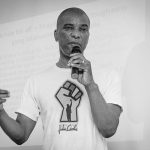
Stafford Scott
Guest Professor
Stafford is a community activist and race equality specialist with over 30 years of experience in anti-racist advocacy work. In 2020, he was named as one of “100 great Black Britons” for his contributions to activism and race relations in the UK. Beginning as a youth worker on the Broadwater Farm Estate, in 1983, he led the Broadwater Farm Defence Campaign, on behalf of the Tottenham Three – whose convictions for the murder of PC Blakelock were overturned in 1991.
Stafford has since worked amongst different agencies, including Waltham Forest Housing Association, the Department of Health and The Kings Fund, providing grassroots solutions to issues of institutional racism affecting the Black community, whilst continuing to support local communities with issues around over-policing, miscarriages of justice and deaths in custody.
Tottenham Rights
Tottenham Rights was initiated as a CIC and a subsidiary of The Monitoring Group (TMG), responding to the police killing of Mark Duggan in 2011 and the UK-wide public disturbances that followed. Working within TMG as an advocate and senior caseworker for eight years, alongside Tottenham Rights cases, Stafford has most recently begun challenging the Metropolitan Police on their discriminatory practices using the Gangs Matrix, use of tasers and other corrupt practices impacting the Black community. Stafford has been a consistent contributor to the Guardian since 2011 and written for various publications, including writing ‘A Dialogue of Equals’ and ‘The Governments Bogus War on Gangs’.
Tottenham Rights was founded in 2011 by Stafford Scott with Suresh Grover (The Monitoring Group [TMG], est 1975), as a sub-initiative of TMG and a continuation of the Broadwater Farm Defence Campaign (1985 – 1993). TR began to support the family of Mark Duggan, following his killing by the Metropolitan Police, and provided wider advocacy support to the grassroots community of Tottenham after the uprisings which began in Tottenham (which later became the nation-wide public disturbances of 2011). Since 2011, Tottenham Rights has supported hundreds of members of both the local community in Tottenham and the wider community within London, with expertise reaching back to the 1980s, and maintains a steady reputation as a key grassroots organisation which challenges institutional racism within the police, local government, healthcare services and other public institutions through campaigning, advocacy, consultancy and other forms of pressure organising.